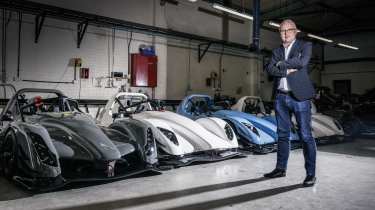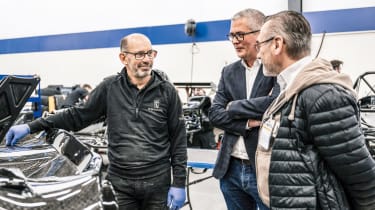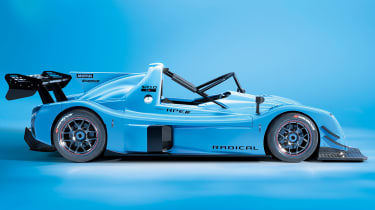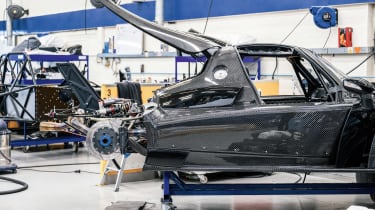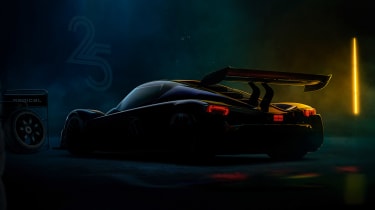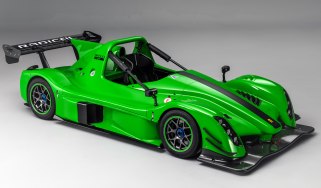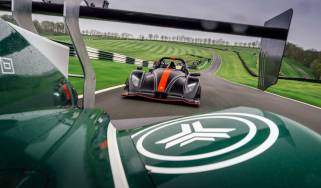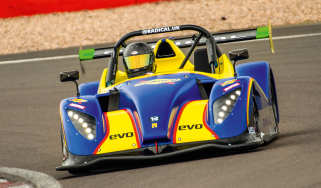Why Radical won't go electric
Having celebrated its 25th birthday, Radical is in rude health – with no plans to go electric, as sales and marketing director Dan Redpath explains
Back in 2005, a vast new swathe of car enthusiasts became aware of the Radical brand for the first time when the firm’s SR8, driven by Michael Vergers, set a new Nürburgring Nordschleife production car lap record of just 6min 55sec. Four years later, with evo’s own Roger Green riding shotgun, Vergers drove a 460bhp SR8LM from Radical’s factory in Peterborough to the Ring and lowered that time to 6min 48sec, a record that would stand for eight years (evo 136). It was a contentious record because the SR8LM – and the SR8 before it – were road-registered via the UK’s single vehicle approval process rather than being fully type-approved production cars. But as a means of promoting the Radical name, it worked a treat.
Formed in 1997 by two enthusiasts, Mick Hyde and Phil Abbott, Radical is still tucked away on the same industrial estate in the north of Peterborough in the East Midlands, but these days it’s a different business. ‘Our customer base has changed from the early days,’ says Dan Redpath, sales and marketing director, who joined from Aston Martin at the start of 2020. ‘Back then it was a lad-and-dad type of product with the car in a Brian James trailer behind a Discovery, with them doing the spannering. Nowadays our customers are high net worth individuals, turning up at the track in their road cars – McLarens, Ferraris and expensive classics – while the race team brings the prepared Radical, so it’s a much more turn-key affair.’
> Radical Project 25 to launch as 850bhp track-only model
The cars have evolved steadily but are essentially true to the original concept, with tubular steel spaceframe chassis and a variety of mid-mounted, largely motorbike-derived engines, re-engineered to Radical’s specification and built by Radical Performance Engines, a wholly owned subsidiary. It’s been quite a journey. From building a car that would be competitive in UK clubman championships, Radical went on to create its own compact, high-revving V8 by splicing together two four-cylinder motorbike engines, set those Nürburgring lap records, build an LMP2 car that competed at Le Mans and sell over 1500 examples of the SR3, its most popular model.
However, until 2020, the company hadn’t made a profit in a decade, says Redpath. ‘I think it had been a very organic journey for the company,’ he continues. ‘The inception of the company was a smart, entrepreneurial move but it wasn’t run in a conventional way. When it was good, it was very good but when it was bad, it was difficult to control.’ In 2016 a new CEO, Joe Anwyll, was appointed and set about stemming the losses. ‘He brought in orthodox business measures whilst recognising what we are: that we sell race cars to wealthy individuals who want to have fun.’
When Covid hit in 2020, Radical was in a good shape from a business perspective. ‘Our customers spend a lot of time travelling, whether it’s for business or pleasure, but they found themselves grounded like the rest of us. Golf companies probably did very well; I would imagine sim companies did very well and we did really well during the tail end of 2020, managing to make a small profit. And then in 2021, we saw record production and record profit.’
Two new models were nearing completion in 2020 and the company took the decision to press on with them, which was tricky given the lockdowns, but in May an update to the SR3, the SR3 XX, was launched and the SR10 was ready by the end of the year.
Redpath recruited six new dealers in 2020 and another six in 2021. ‘We now have 33 dealers across 21 countries and that gives us reach into places that a 120-strong company based in the East of England couldn’t get to.’ These dealers – predominantly race teams that can prepare and run Radicals rather than dealers in the traditional sense – span the globe, from British Columbia in the west of Canada, through the United States, Europe, the Middle East and Asia, to Australia and New Zealand. There are 12 single-make Radical series across four continents, including the factory-supported Hagerty Radical Cup UK and the Blue Marble Radical Cup North America.
> Radical SR10 XXR revealed as 574bhp/ton track weapon
Radical describes itself as the UK’s largest manufacturer of race cars, producing between 200 and 250 cars per year. ‘Not all customers are racers,’ says Redpath. ‘A lot of them are, but some just want to do trackdays.’ Crucially, not many of them want to drive their Radicals on the road – only about two in 100 are road cars. ‘The road cars have always been a sort of spin-off. If you look at the back catalogue, about ten years ago there was the road-going version of the SR3, the SR3 SL, and more recently a road-going version of the RXC, and even more recently than that the Rapture. In each instance, the race car was developed first and then adapted to be a road car, as opposed to the other way around.’
This means that while the UK’s other specialist car makers are wrestling with the challenge of how they respond to the 2030 ban on petrol and diesel-powered new cars, Radical will simply stop making cars for the road. ‘As things stand, Radical would not do electric,’ says Redpath. ‘We would retain a combustion engine and the main reason for that is because our cars are designed to be exhilarating, exciting and visceral, and we don’t believe that’s possible with an EV powertrain, because of the mass and lack of character.
‘There’s more to come with the EV story,’ he says. ‘In my view, the “exam paper” was given to the industry already half answered. It was “Give us zero emissions but – in brackets – it must be EV.” They should have missed out the brackets and let the engineers figure out how to do zero emissions.’ He reckons the infrastructure for us all to run electric cars isn’t there and says that for many sectors, including farming and shipping, electric just won’t work because it doesn’t offer the range or the number of hours required. ‘Those big, multi-million-pound earth-movers work around the clock, so if they need to be taken off line to be plugged in, then all of a sudden the running costs shoot up. There are other segments of the industry that have big motives to pursue other net-zero fuels that I believe will cascade down into road cars.
‘For us, the immediate, attractive option is biofuels because we can retain combustion engines and the exhilaration and excitement that comes with them.’ A few months ago, Radical launched the SR3 XXR, its first car with an engine configured to run on advanced biofuels. This has largely been a process of proofing the fuel system of the engine – the 1500cc, Gen 5, RPE four-cylinder unit – against ethanol. The XXR also has a fuel composition sensor to detect different percentages of ethanol, so customers can switch between high-octane gasoline and biofuels with up to 85 per cent ethanol content. Peak power is up from 226 to 232bhp but largely because RPE has taken the opportunity to improve cylinder head flow, lighten the conrods and rework the engine and gearbox mapping.
Through RPE, Radical produces bespoke engines with four, six or eight cylinders, offering from 182bhp to 654bhp, but it’s the 1340 and 1500cc versions of the RPE ‘four’ that account for by far the greatest volume. They power the SR1 and SR3 models and account for 70 per cent of Radical engines. RPE’s version of the Ford 2.3 EcoBoost fitted to the Rapture (360bhp) or SR10 (425bhp) represents 20 per cent of sales while the most potent engines, the 2.7-litre RPE ‘Macroblock’ V8 (411bhp) fitted to the SR8 and the RPE V6 twin-turbo (500-654bhp) fitted to the RXC models together make up the last 10 per cent.
Some specialists intend to make ICE cars for as long as they are permitted to, but Caterham is already predicting that supplies of engines will dry up well before 2030. Redpath is coy about Radical’s arrangements, saying only the company will be ‘very well supplied’ into the next decade. Radical has been building its own Macroblock V8 with a flat-plane crank for almost 20 years now and could probably manage a whole engine if necessary, but its arrangement with Suzuki suits it very well.
To celebrate its 25th anniversary, Radical has announced a new model, the R25, and teased it with an illustration. The car is currently in development and should be ready later this year, while 2023 will also see the second running of the Radical World Finals. The inaugural event was held at Spring Mountain, a private racetrack in Las Vegas, late last year, and attracted Radical racers from championships around the world. ‘Customer feedback was incredible so it’s something that will be in the diary towards the end of this year,’ says Redpath. The company has also tracked down the SR8 LM that set the Nürburgring lap record back in 2008. ‘The current owner lives in Ireland, so we’re talking to him about borrowing the car for some events this year,’ says Redpath. Hopefully it’ll be driven to some of them too – seems only right!
This story was first featured in evo issue 307.

